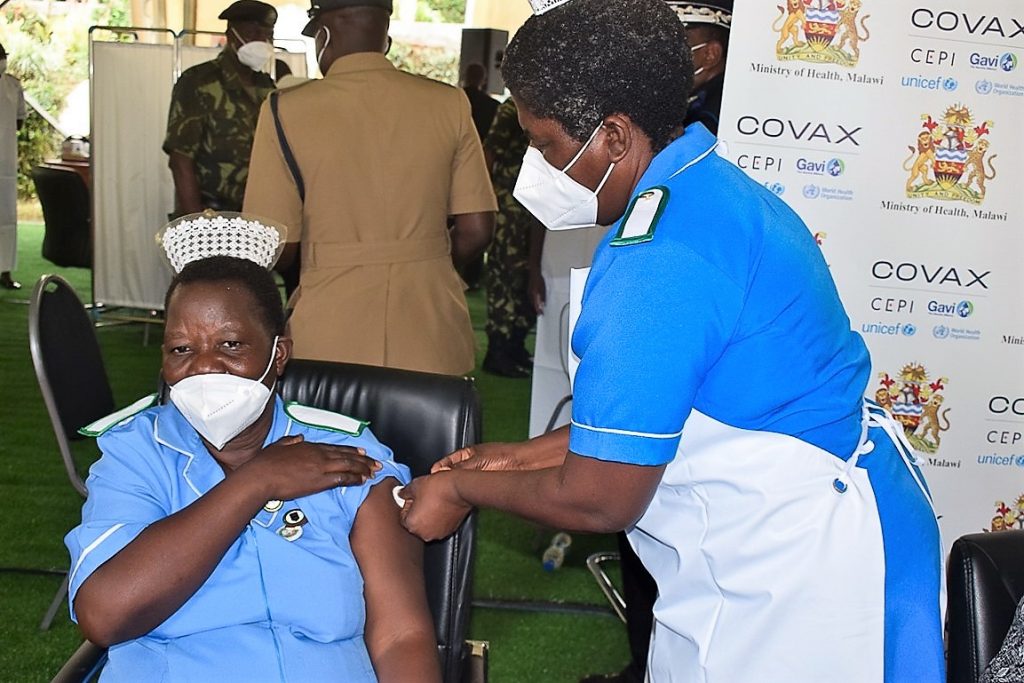Malawi least jabbed in SADC
Malawi is currently the least vaccinated country among the 16-member Southern African Development Community (Sadc) region, statistics show.
Malawi is at 0.2 percent followed by Zambia at 0.4 percent and Lesotho at 0.9 percent.

Mozambique is at 1.0 percent, Namibia at 1.4 percent, Angola at 2.0 percent, Eswatini at 2.4 percent, South Africa at 3.9 percent and Zimbabwe at 4.5 percent, Seychelles at 34.2 percent while Mauritius is the highest vaccinated country at 70.2 percent.
According to Public Health Institute of Malawi, only 43 165 people have so far taken both jabs while 385 242 have received the first jab.
Public health experts and health rights activists yesterday said that while Malawi is not in competition with any country in the region, being the lowest is not an accolade to be proud of.
In an interview, epidemiologist Dr. Titus Divala said despite Malawi being the lowest vaccinated country, other countries are not that far since they are below five percent.
He said there are numerous factors that can be attributed to the lower vaccination figure, including late preparations on vaccines, overreliance on donors and the Covax Facility which has not been smooth as expected.
Divala said: “We relied on donations and did not commit much budget towards the vaccine. Mauritius and Seychelles have high vaccination rates because they bought the vaccine while Malawi and most countries in [Sadc] region were waiting for Covax.”
However, he said the country is easy to save from the Covid-19 pandemic using the vaccines that must be looked at as strength.
Divala said, for example, while the United Kingdom (UK) for example, has been able to vaccinate 40 million people to reach a stage where death is no longer common, where as vaccinating only three million would move the country to the same level if done systematically by age.
Kamuzu University of Health Sciences (Kuhes) professor in epidemiology Adamson Muula said the number of doses received has been a major limitation to the vaccination campaign.
He also said the other factor is limitation of global health diplomacy, which is taught in schools and colleges but not effectively implemented in real life.
“It is important that we also compare ourselves with Zimbabwe. The country, despite its numerous challenges, can teach lessons. It has spent a lot of money to buy Covid-19 vaccines. We have been effectively refusing to allocate nominal amounts of money to save people’s lives.”
Health and Rights Education Programme executive director Maziko Matemba said the lower figures should be a wake-up call for the country.
He said: “Covid-19 turns to be an economic risk among countries. We know that for Malawi to achieve the Malawi Vision 2063 [MW2063] agenda, trade is key.”
Matemba also stressed that for the country to have access to enough vaccines, there will be need to mobilise resources locally in the national budget and foreign support.
On Saturday, the country received 192 000 doses of AstraZeneca vaccine.
In an earlier interview, Ministry of Health Principal Secretary Dr Charles Mwansambo said the country will between July and September receive about 1.3 million doses of assorted Covid-19 vaccines.
He said apart from the AstraZeneca vaccine, other vaccines scheduled to arrive are the Johnson and Johnson and the Pfizer.
When asked why government is relying on donors to purchase vaccines, Mwansambo did not respond to our message since Saturday.
Malawi received the first 360 000 doses of the AstraZeneca vaccines from the Serum Institute of India on March 5 this year.
Another batch of 50 000 doses from India arrived in April and 102 000 doses from African Union (AU) bringing the total number of the doses to 512 000. Last month, the country ran out of the vaccines, automatically suspending temporarily the vaccination exercise.





